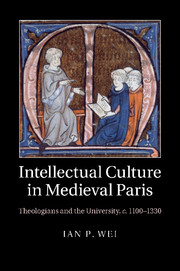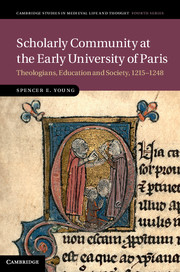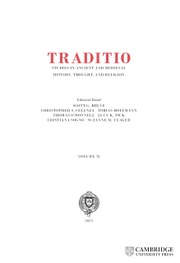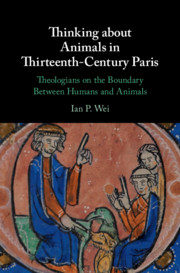Intellectual Culture in Medieval Paris
In the thirteenth century, the University of Paris emerged as a complex community with a distinctive role in society. This book explores the relationship between contexts of learning and the ways of knowing developed within them, focusing on twelfth-century schools and monasteries, as well as the university. By investigating their views on money, marriage and sex, Ian Wei reveals the complexity of what theologians had to say about the world around them. He analyses the theologians' sense of responsibility to the rest of society and the means by which they tried to communicate and assert their authority. In the late thirteenth and early fourteenth centuries, however, their claims to authority were challenged by learned and intellectually sophisticated women and men who were active outside as well as inside the university and who used the vernacular – an important phenomenon in the development of the intellectual culture of medieval Europe.
- Uses extended textual analysis wherever possible to facilitate interdisciplinary analysis and establish common ground between specialists in different fields
- Includes women in medieval intellectual history, contributing towards the wider development of a general history of ideas for the period
- Cuts across conceptual boundaries that have separated fields of study in intellectual and institutional history, abstract philosophy and theology, and ethics and moral theology
Reviews & endorsements
"What does Ian Wei bring to this subject that has not been done before, or how has he reshaped it? The answer is he has done much in both respects. He has added a large amount of material which, if not precisely new, is rarely presented in such detail. And by concentrating on the interface between scholastic thought and medieval social and economic life, he has reshaped the narrative … Wei’s book is, without question, a major contribution to the intellectual history of the twelfth and thirteenth centuries. It is full of new and exciting observations, engagingly written, in a way that will be accessible to an interested general reader as well as specialists."
William J. Courtenay, Reviews in History (history.ac.uk/reviews)
"Ian Wei rises admirably to the huge challenge of explaining medieval theology to a modern lay audience, making extensive use of original sources in translation while anchoring them firmly in their historical context in an accessible and systematic manner. This masterclass in expository analysis will become an indispensable introduction to a central aspect of medieval thought."
Peter Denley, Reader in History, Queen Mary, University of London
"With imaginative insight, clarity, and judicious scholarship, Ian Wei captures the very spirit of the masters and students in the schools of medieval Paris. Wei conveys the sheer excitement of what it was like to think, study, and teach in the early university. The masters brought a moral intensity to reflecting on their own social roles within the university and as communicators with a wider public. This is a book that will welcome any reader interested in the genealogies of our modern institutions."
Rita Copeland, Professor of Classical Studies and English, University of Pennsylvania
"… an extremely important contribution to the intellectual history of the twelfth and thirteenth centuries … A masterpiece. Summing up: essential. Upper-division undergraduates and above."
J. M. B. Porter, Choice
"Wei’s study crosses the boundaries of philosophy, history, and theology,
proving the interdisciplinary methods necessary to any historical study of the
Middle Ages."
Gillian Adler, Comitatus
Product details
November 2014Paperback
9781107460362
462 pages
230 × 150 × 25 mm
0.65kg
Available
Table of Contents
- Introduction
- 1. The twelfth-century schools of northern France
- 2. The twelfth-century monasteries and Hugh of St Victor
- 3. The University of Paris in the thirteenth century
- 4. Communication and control
- 5. Sex and marriage
- 6. Money
- 7. Anti-intellectual intellectuals in the late thirteenth and early fourteenth centuries: a new context
- Bibliography.





.jpg)

